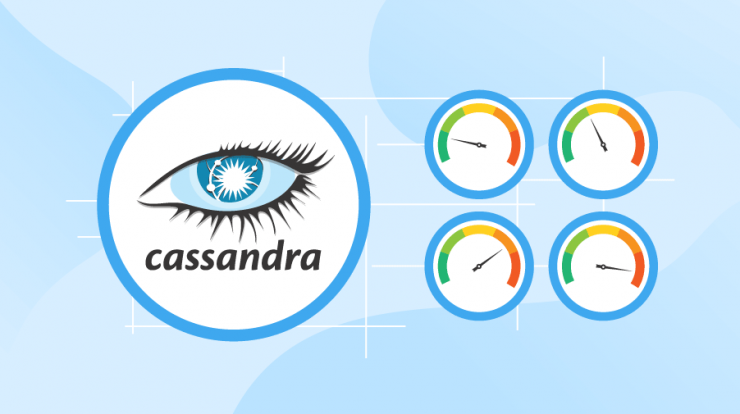
Apache Cassandra is an open source non-relational, or NoSQL, a database that enables continuous availability, tremendous scale, and data distribution across multiple data centers and cloud availability zones. It is a highly scalable and available distributed database that facilitates storing and managing high-velocity structured data across multiple commodity servers without a single point of failure.
Simply put, Cassandra provides a highly reliable data storage engine for applications requiring immense scale. It is one of the most efficient NoSQL databases available today. DataStax offers a free packaged distribution of Apache Cassandra. This also includes various other tools such as a Windows Installer, DevCenter, and the DataStax professional documentation.
Characteristics of Cassandra
- It is a column-oriented database.
- It is highly consistent, fault-tolerant, and scalable.
- It was created for Facebook and was later open sourced.
- The data model is based on Google Bigtable.
- The distributed design is based on Amazon Dynamo.
History of Cassandra
- Cassandra was developed at Facebook for inbox search.
- It was open-sourced by Facebook in July 2008.
- Cassandra was accepted into Apache Incubator in March 2009.
- It was made an Apache top-level project since February 2010.
What are the Features of Cassandra?
Cassandra has become so popular because of its outstanding technical features. Given below are some of the features of Cassandra:
- Elastic scalability − Cassandra is highly scalable; it allows to add more hardware to accommodate more customers and more data as per requirement.
- Always on architecture − Cassandra has no single point of failure and it is continuously available for business-critical applications that cannot afford a failure.
- Fast linear-scale performance − Cassandra is linearly scalable, i.e., it increases your throughput as you increase the number of nodes in the cluster. Therefore it maintains a quick response time.
- Flexible data storage − Cassandra accommodates all possible data formats including: structured, semi-structured, and unstructured. It can dynamically accommodate changes to your data structures according to your need.
- Easy data distribution − Cassandra provides the flexibility to distribute data where you need by replicating data across multiple data centers.
- Transaction support − Cassandra supports properties like Atomicity, Consistency, Isolation, and Durability (ACID).
What makes Apache Cassandra unique?
Cassandra is one of the most efficient and widely-used NoSQL databases. One of the key benefits of this system is that it offers highly-available service and no single point of failure. This is key for businesses that can afford to have their system go down or to lose data. With no single point of failure, it offers truly consistent access and availability.
Another key benefit of Cassandra is the massive volume of data that the system can handle. It can effectively and efficiently handle huge amounts of data across multiple servers. Plus, it is able to fast write huge amounts of data without affecting the read efficiency.
Cassandra offers users “blazingly fast writes,” and the speed or accuracy is unaffected by large volumes of data. It is just as fast and as accurate for large volumes of data as it is for smaller volumes.
Another reason that so many enterprises utilize Cassandra is its horizontal scalability. Its structure allows users to meet sudden increases in demand, as it allows users to simply add more hardware to accommodate additional customers and data. This makes it easy to scale without shutdowns or major adjustments needed. Additionally, its linear scalability is one of the things that helps to maintain the system’s quick response time.
Who should use Cassandra?
If you need to store and manage large amounts of data across many servers, Cassandra could be a good solution for your business. It’s ideal for businesses who:
Can’t afford for data to be lost
Can’t have their database down due to the outage of a single server
Further, it’s also easy to use and easy to scale, making it ideal for businesses that are consistently growing. At its core, Apache Cassandra’s structure is “built-for-scale” and can handle large amounts of data and concurrent users across a system. It lets major corporations store massive amounts of data in a decentralized system. Yet, despite the decentralization, it still allows users to have control and access to data.
And, data is always accessible. With no single point of failure, the system offers true continuous availability, avoiding downtime and data loss. Additionally, because it can be scaled by simply adding new nodes, there is constant uptime and no need to shut the system down to accommodate more customers or more data. Given these benefits, it’s not surprising that so many major companies utilize Apache Cassandra.
Cassandra Use Cases
Cassandra is a non-relational database that can be used for different types of applications. Here are some use cases where Cassandra should be preferred.
- Messaging
Cassandra is a great database for the companies that provides Mobile phones and messaging services. These companies have a huge amount of data, so Cassandra is best for them.
- Internet of things Application
Cassandra is a great database for the applications where data is coming at very high speed from different devices or sensors.
- Product Catalogs and retail apps
Cassandra is used by many retailers for durable shopping cart protection and fast product catalog input and output.
- Social Media Analytics and recommendation engine
Cassandra is a great database for many online companies and social media providers for analysis and recommendation to their customers.
I hope you find this particular blog helpful and informative. There is so much to learn, keep learning and exploring.
Thank You!!
- Mastering Qualitative Research: The Role of Focus Groups in Data Collection - July 11, 2024
- What is robots ops? - July 10, 2024
- 5 Effective Online Learning Strategies for DevOps Professionals - July 4, 2024

